Listen "Phoenix Air Quality Reflects Typical Regional Patterns"
Episode Synopsis
As of today, the air quality in Phoenix, Arizona, presents a situation that is both typical of the region and reflective of broader environmental patterns affecting urban areas. Phoenix, a city well-known for its hot desert climate, often experiences fluctuations in air quality due to various local and regional environmental factors.Today's air quality index (AQI) for Phoenix shows moderate levels, which is common for the city. The AQI is a standardized system used to gauge air quality based on five major air pollutants regulated by the Clean Air Act: ground-level ozone, particulate matter (PM2.5 and PM10), carbon monoxide, sulfur dioxide, and nitrogen dioxide.The current primary pollutant contributing to Phoenix's AQI is particulate matter, specifically PM2.5. These fine particles, with a diameter of 2.5 micrometers or smaller, can pose health risks when inhaled as they penetrate deep into the lungs and even enter the bloodstream. High PM2.5 levels in Phoenix are often attributed to a combination of vehicle emissions, industrial activities, and natural sources like dust storms that are prevalent in this desert environment.Ground-level ozone is another significant concern, particularly during the warmer months. Ozone is not emitted directly into the air but forms when sunlight reacts with pollutants such as volatile organic compounds (VOCs) and nitrogen oxides. Today's levels are moderate, but with Phoenix's characteristic sunny weather, ozone levels can quickly rise, especially in the afternoon.The health implications of the current air quality in Phoenix depend largely on individual health conditions. People with respiratory issues, children, and the elderly are generally more susceptible to the impacts of poor air quality. On days when the AQI indicates moderate levels, sensitive groups are advised to limit prolonged outdoor exertion.Efforts to improve air quality in Phoenix include various government and community initiatives aimed at reducing emissions and promoting sustainable practices. These include stricter vehicle emission standards, encouragement of public transit use, and policies to control industrial pollution.Overall, while Phoenix's air quality today is moderate, it underscores the ongoing challenge of managing air pollutants in rapidly growing urban environments. Continuous monitoring and adaptive strategies are crucial in minimizing health risks and fostering a cleaner and safer environment for all residents.This content was created in partnership and with the help of Artificial Intelligence AI
More episodes of the podcast Phoenix Air Quality Report - Daily
Phoenix Enjoys Excellent Air Quality Today
23/08/2025
 ZARZA We are Zarza, the prestigious firm behind major projects in information technology.
ZARZA We are Zarza, the prestigious firm behind major projects in information technology.
